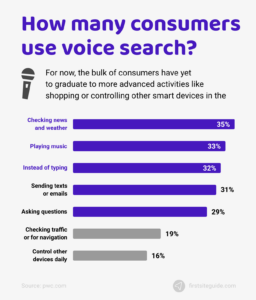The search bar has historically been the most crucial feature for any e-commerce platform. It has been proven statistically that great sales are directly proportional to the best search optimization in an e-commerce platform. The more intuitive, natural, connected, or even vocal the search is, the more appealing and accessible it would be for a buyer to get what they want. That being so, e-commerce companies have been on a war footing to edge each other out and provide the best voice search experience to their customers.
Voice Search the Future
Voice search empowers customers to simply speak in their search query instead of tedious typing in or surfing through a menu. The search engine then uses AI and Natural Language Processing (NLP) to decode with great precision and understand what the buyer is looking for and has the results ready in no time. 

 In a nutshell, voice searches provide consumers with great convenience, accuracy, and a futuristic experience. All the available statistics show that consumers worldwide have gleefully adopted the technology, and predictions are that voice-based search capacities will be the deciding factor to make or break an e-commerce platform.
In a nutshell, voice searches provide consumers with great convenience, accuracy, and a futuristic experience. All the available statistics show that consumers worldwide have gleefully adopted the technology, and predictions are that voice-based search capacities will be the deciding factor to make or break an e-commerce platform.
How to optimize your e-commerce platform for voice search?
While it certainly is the future, voice search capacities have specific steps to be followed for an e-commerce platform to set it up and leverage the best out of the feature. It also requires the expertise of an experienced internal search engine service provider such as ‘Expertrec’ for an efficient, smooth, quick setup. Knowing your customer and their device preferences Your sole aim as an eCommerce vendor should be to provide your customer with the best experience, and for that, you should ensure that you know your customer, their devices, demographics, needs, and preferences. You could use the services of analytics or a market research company to get an insight into your targeted audience.
- Keywords the Backbone While SEO uses strategically placed keywords, voice searches need a different keyword type, which is more like a long-tail keyword that is more than five words in length and conversational keywords. Since the queries are going to be conversational, you would have to identify long-tail and conversational keywords through your initial analysis and add modifiers to it such as the 5 W’s – ‘what,’ ‘when,’ ‘where,’ ‘who’ ‘why’; and also, how. It is recommended that you seek the assistance of a keyword search tool.
- Conversational language is the essence of compelling content. Content in your website would be the most significant deciding factor that would enable you to rank up in Google or other search engines. Having just product descriptions on your site might result in a duplication of keywords with another seller who sells similar products, thus resulting in a possible low ranking in the search engine. So, the best strategy is to have active blogs with valuable content and key strings based on your analysis hidden strategically in your blogs. You could disperse your many keywords in carefully articulated numerous active blogs than having them all in one blog. Remember that since your goal is to provide voice search capabilities, you should ensure that your blogs are more conversational, containing key conversations that a searcher could call out in his search.
- Placing Speakable Schema Markups on your website. There is a need to focus on speakable schema markups to enable your website to highlight sections conducive to text-to-speech (TTS) conversation. This would require Google voice or other search engines to read and recognize applicable content and send your website’s URL to the searcher’s device.
- Voice Search and Mobile-First Websites Making sure that your website is optimized to be mobile-first would be absolutely important to feature in voice search. With the most visits to any e-commerce platform coming from mobile devices, voice search algorithms would use mobile versions of websites as the key ranking factor.
Try ‘Expertrec’ While it is clear that the success of an e-commerce platform in the future would be shaped by the quality of voice search options provided, an e-commerce vendor must follow the proper steps to set up a voice search engine in their platform. ‘Expertrec’ assists you in creating a customized search experience by providing simple options for defining the search interface and search experience. Our search results load within milliseconds, giving your site users a quick and smooth search experience. Our search engine index PDF, word, excel and more file formats so that your customers can leverage from multiple formats, and what’s best is that the search results are always Ad-Free. A quick and easy set up that is multi device friendly, integrated across multiple platforms and having search capabilities in over 30 languages. You can experiment with these easy options to see how they modify the search experience to one that is simple, fast, and personalized.




